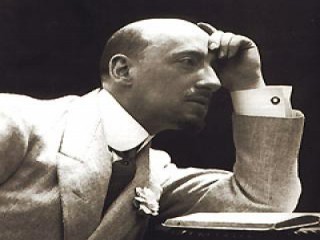
Gabriele D'Annunzio biography
Date of birth : 1863-03-12
Date of death : 1938-03-01
Birthplace : Pescara, Italy
Nationality : Italian
Category : Famous Figures
Last modified : 2011-05-12
Credited as : Poet and patriot, ,
The Italian poet and patriot Gabriele D'Annunzio was one of the last major representatives of fin-de-siecle decadence in European literature.
Gabriele D'Annunzio was born on March 12, 1863, at Pescara of well-to-do parents. He was educated at the Convitto Cicognini of Prato; he then attended the University of Rome but did not take a degree. Of small physique, bald at an early age, he nevertheless lived in Rome the life of a dandy and ladies' man. In 1883 he married the duchess Maria Hardouin di Gallese, with whom he had three sons. His daughter Renata (the Sirenetta of the novel Notturno) was born out of wedlock by a married woman, Maria Gravina Cruyllas, one of his many companions.
In 1910 D'Annunzio was forced to sell La Capponcina, a sumptuous villa near Florence, where he had lived since 1899. He moved to France, settling finally in Arcachon. In 1915 he returned to Italy to campaign for its entry into World War I. He made famous speeches at Quarto dei Mille and from the steps of Rome's Capitoline Hill. An active participant in the war, he flew over Trieste (1915) and Vienna (1918) and lost the sight of an eye after a bad landing. In 1919 he and his legionnaires occupied Fiume, thus anticipating its later union with Italy. D'Annunzio's rightist leanings made him sympathetic to the Fascist regime, which in 1924 conferred on him the title of Principe di Montenevoso. The government also gave him a villa, Il Vittoriale, on the Lake of Garda, where he resided until his death on March 1, 1938.
One of the most prolific writers of modern Italian literature, D'Annunzio tried all genres with varying success. His accomplished virtuosity in technical matters is evident primarily in his poetry, where the search for new sensual experiences is one of his prime concerns. He also glorified heroic deeds in his patriotic poetry (Odi navali, 1892-1893). A synthesis and symphonic repetition of his earlier poetry is evident in the cycle Laudi del cielo, del mare, della terra e degli eroi (1903-1904; Hymns of the Sky, Sea, Earth and Heroes).
















